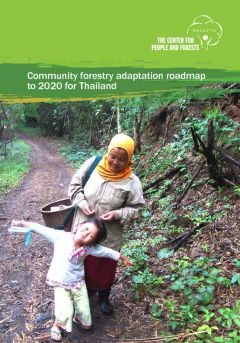Resource information
Community forestry supports local level climate change adaptation by enhancing resilience in multiple ways: supporting livelihoods and income, increasing food security, leveraging social capital and knowledge, reducing disaster risks and regulating microclimates. However, adaptation planning has, by and large, not included community forestry as a viable climate change adaptation tool. To address this, RECOFTC – The Center for People and Forests has developed a set of roadmaps to help guide the meaningful inclusion of community forestry in climate change adaptation planning through the year 2020. To develop the roadmaps, RECOFTC – The Center for People and Forests conducted a desk-based literature review on the link between community forestry and climate change adaptation in the region, and in the selected countries. Based on the review, a ten-question interview template was drafted to gather primary data from experts, defined as practitioners, policy-makers and researchers with experience in community forestry and/or adaptation in the included countries. The information provided by these interviews informed the analysis and recommendation of these reports.
Community forestry in Thailand has an important role to play to increase local adaptive capacity to climate change. In the context of agricultural uncertainty, community forestry provides an effective approach to improved livelihoods both directly (increased access to forest food products) and indirectly (increased employment and entrepreneurial opportunities and livelihood diversification) Community forestry can also help leverage social capital and knowledge with regards to adaptive forest management, all while providing institutional mechanisms to prepare for disaster. Furthermore, through forest restoration activities, community forestry can help regulate microclimates.


